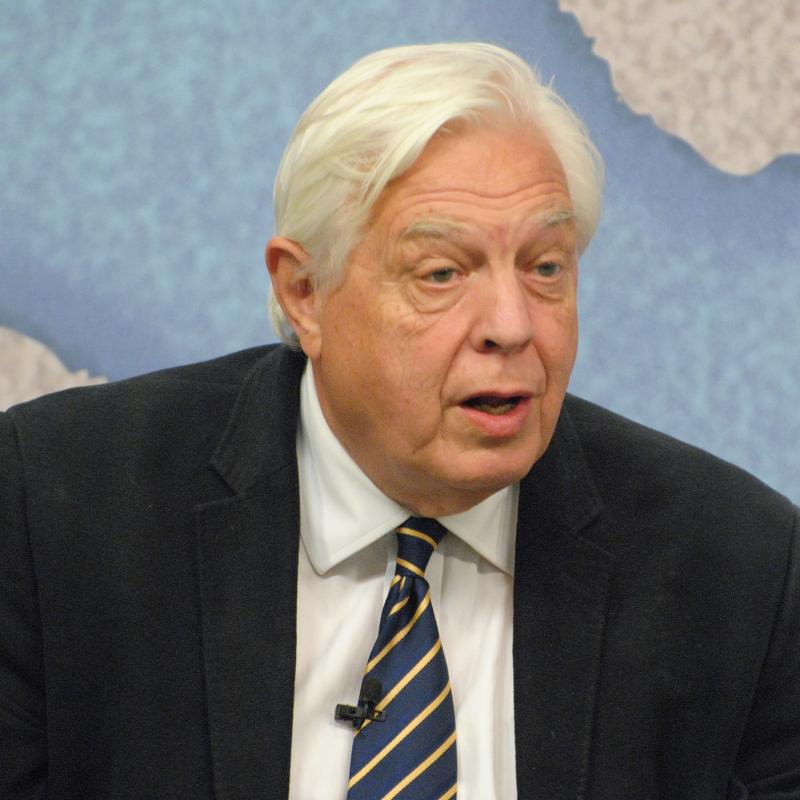Breadcrumb
In his new book Why Politics Fails, award-winning Oxford professor Ben Ansell shows that it's not the politicians that are the problem, it's that our collective goals result in five political 'traps'.
- Democracy: we all want a say in how we're governed, but it's impossible to have any true 'will of the people'.
- Equality: we want to be treated equally, but equal rights and equal outcomes undermine each other.
- Solidarity: we want a safety net when times are tough, but often we care about solidarity only when we need it ourselves.
- Security: we want protecting from harm, but not if it undermines our freedoms.
- Prosperity: we want to be richer tomorrow, but what makes us richer in the short run makes us poorer over the long haul.
Join Ben Ansell, BBC World Affairs Editor and renowned foreign correspondent John Simpson, and Blavatnik Professor of Government and Public Policy Pepper Culpepper as they discuss how we can escape these traps and avoid political failure.
Speakers
Ben Ansell is Professor of Comparative Democratic Institutions at Nuffield College, University of Oxford. Following a PhD at Harvard he taught at the University of Minnesota for several years, becoming a full Professor at Oxford in 2013 at the age of thirty-five. He was made Fellow of the British Academy in 2018, among the youngest fellows at that time. His work has been widely covered in the media, including in the World Bank's World Development Report, The New York Times, The Economist, The Times and on BBC Radio 4's 'Start the Week'. He is the Principal Investigator of the multi-million-pound ERC project 'The Politics of Wealth Inequality', co-editor of the most-cited journal in comparative politics and has written three award-winning academic books. This is his first book for a general reader.
John Simpson, the BBC’s World Affairs Editor, is a household name and the most distinguished foreign correspondent of the age. Recognised as the “David Attenborough” of news, John is a multi-award winning, veteran news broadcaster (and accomplished author) who has covered almost every major event of the world from the 1960s to the present day. His seminal reports on the big moments of recent history make up an illustrious list to include the Iranian Revolution, the First and Second Gulf Wars, the Fall of the Soviet Union and the Berlin Wall, the end of Apartheid in South Africa, the Genocide in Rwanda, the wars in the former Yugoslavia and the Tiananmen Square massacre in Beijing.
John’s stories of war and revolution are many and varied. An eye-witness of the many wars in the Middle East and Afghanistan, the Irish troubles and the South African and Rhodesian struggles, as well as in the former East Block of Europe and Latin America, it is safe to assume that ‘whatever the headline of the daily news might be, John will be there.’ John has reported from 140 countries and interviewed 200 world leaders and dictators ranging from Michael Gorbachev and Vladimir Putin, Nelson Mandela, British Prime Ministers and U.S. Presidents to Fidel Castro, Colonel Gaddafi, Robert Mugabe and Saddam Hussein. He met successive heads of the IRA, Hezbollah, Hamas, Taliban and of the Medellin and the Cali Drug Cartels at the height of their power. In 2022, John’s latest current affairs programme 'Unspun World with John Simpson’ started airing weekly on BBC2 and is ongoing.
Pepper Culpepper is Vice-Dean for Academic Affairs and Blavatnik Chair in Government and Public Policy at the Blavatnik School of Government. His research focuses on the intersection between capitalism and democracy, both in politics and in public policy. Prior to coming to the Blavatnik School, he taught at the European University Institute and at the Harvard Kennedy School. His book Quiet Politics and Business Power: Corporate Control in Europe and Japan (Cambridge University Press 2011), was awarded the 2012 Stein Rokkan Prize for Comparative Social Science Research. He is the author of Creating Cooperation (Cornell University Press, 2003) and co-editor of Changing France (with Peter Hall and Bruno Palier, Palgrave 2006) and of The German Skills Machine (with David Finegold, Berghahn Books 1999). His work has appeared in Comparative Political Studies, International Organization, Politics & Society, Socio-Economic Review, World Politics, Revue Française de Science Politique, Politische Vierteljahresschrift, West European Politics, Journal of European Public Policy, Journal of Public Policy, Business and Politics, and the Oxford Review of Economic Policy, among others. He has published commentary on public policy issues in the Washington Post, Le Monde, International Herald Tribune, and the New Republic. A former Marshall Scholar at the University of Oxford, he has also held long-term visiting appointments in France, Germany, and Japan.



